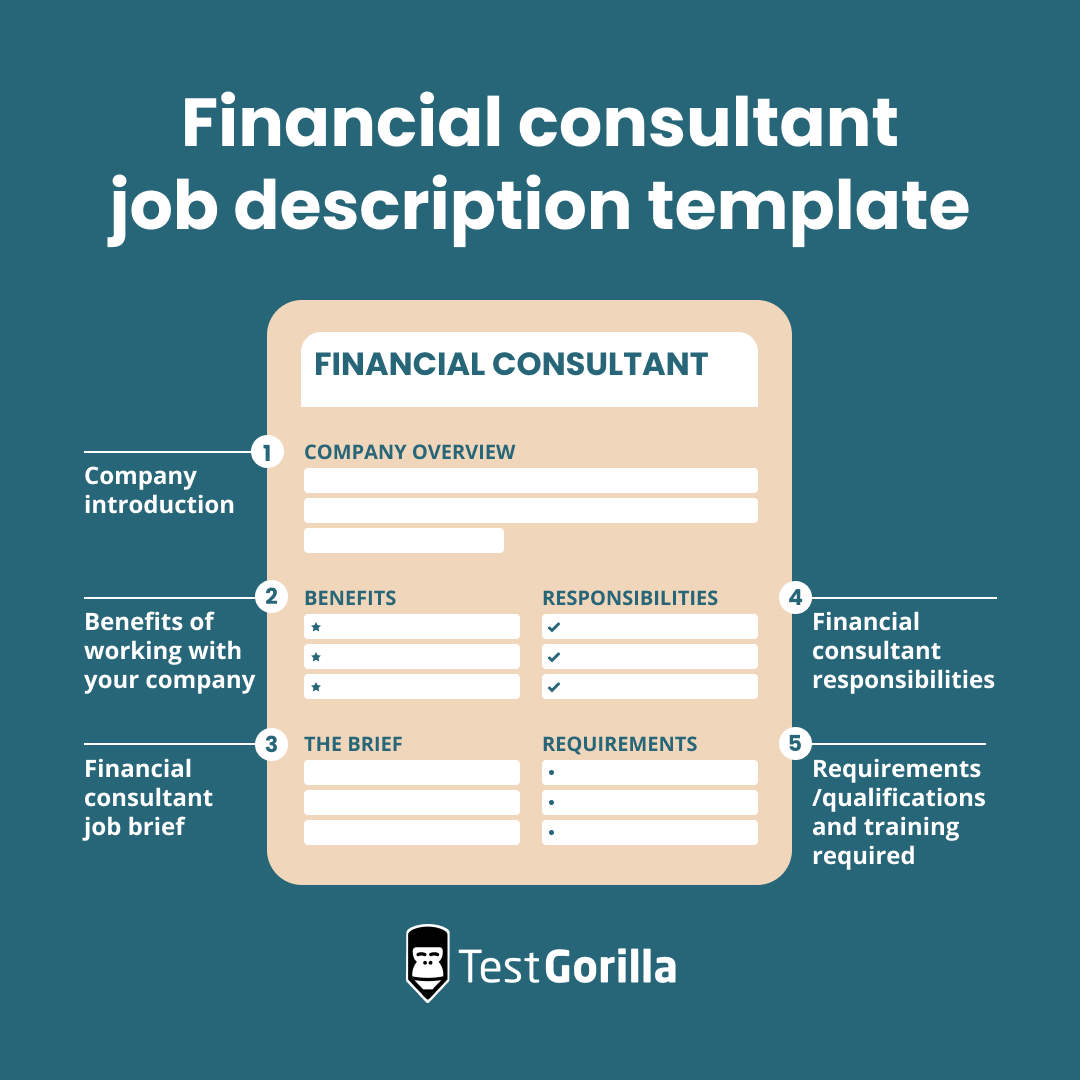Financial consultants play a pivotal role in managing and growing their client or company’s finances. Hiring the wrong person for this job can lead to losses, missed opportunities, regulatory mishaps, and other problems, putting your organization’s financial health and future at risk.
That’s why it’s crucial to have a robust hiring process in place for this role, starting with a carefully crafted job description that outlines the core responsibilities and requirements to attract the right candidates.
In this guide, we help you write an effective financial consultant job description. You’ll learn about the key skills to look for, mistakes to avoid, and how to assess candidates. Finally, we also provide you with a ready-to-use template to kickstart your hiring process immediately.
Table of contents
- What is a financial consultant?
- Key skills to look for in financial consultants
- How to write an effective financial consultant job description
- Financial consultant job description template
- Three things to avoid when writing a financial consultant job description
- Next steps: Attracting and assessing financial consultant candidates
- FAQs
- Hiring the best financial consultants with TestGorilla
What is a financial consultant?
A financial consultant, also known as a financial advisor or planner helps individuals or businesses manage their day-to-day finances, investments, taxes, and financial risks. Here are some responsibilities typical of the role:
Creating comprehensive financial plans to achieve a company or client’s financial goals.
Keeping a close eye on a company or client’s financial statements, cash flow, and other indicators of financial health.
Providing guidance on investments that align with the business or client's financial objectives and risk appetite.
Assessing and managing financial risk, including setting up the right insurance policies, creating emergency funds, and more.
Maximizing tax liabilities by identifying tax-efficient investments, deductions, and credits.
Evaluating capital expansion options, such as external funding, loans, and so on.
Key skills to look for in financial consultants
The specific skills required for your financial consultant role will depend on your company’s needs. However, any good financial consultant should demonstrate the below fundamental capabilities to succeed in this job.
Hard skills
Adept at creating and analyzing balance sheets, income statements, cash flow statements, and other financial management reports to assess an entity’s financial performance.
A strong understanding of various asset classes and investment strategies to grow a client or organization’s wealth.
A solid and up-to-date understanding of financial, compliance, and tax regulations that apply to the client or business.
Familiarity with tax preparation tools, like Intuit; financial planning software, such as eMoney Advisor; investment analysis tools, including Bloomberg Terminal; and finance and accounting solutions, like Xero or QuickBooks.
Proficiency in Microsoft Excel for financial modeling and data analysis.
Soft skills
Empathy and active listening are essential for making decisions based on client or company risk profiles.
Exceptional communication skills are needed to explain complex financial concepts clearly and understandably.
Strong problem-solving abilities help to identify financial challenges, evaluate options, and develop suitable solutions.
Good attention to detail is required to spot any missing data, discrepancies, or other errors in financial reports.
The best insights on HR and recruitment, delivered to your inbox.
Biweekly updates. No spam. Unsubscribe any time.
How to write an effective financial consultant job description
Use the below strategies to write a well-thought-out financial consultant job description.
Align it with your company’s specific needs
Financial consultants have a broad range of responsibilities, overseeing everything from daily income and expenses to investment planning. Conduct a job analysis to determine business demands, skills gaps, and any specializations you’re looking for, and include these in your job description.
For instance, if you’re in the process of securing financing, you might need a financial consultant with experience in raising capital rather than a generalist.
Discuss compensation and benefits
Most financial consultants are driven by good pay and benefits packages. Consider including information like salary range, bonus structure, and other employee perks. This can help to attract top talent and give you an edge over competing organizations.
Specify work arrangements and location
Financial consultants often require access to highly sensitive financial data. Thus, some companies require all financial consultants to work full-time from the office.
Whether you can offer flexibility or not, it’s critical to specify the work arrangements for this role upfront to avoid hiring candidates whose working preferences misalign with your company’s.
Financial consultant job description template
Below, you can find a standard financial consultant job description template to get you started.
Company introduction
Share your company’s name, industry, mission, and what products and services it offers. Outline your company’s achievements, milestones, assets under management, and other information that shows candidates why it’s leading in its space.
Benefits of working with [your company]
Highlight what advantages and rewards candidates can expect to receive if they work for your organization. For instance, discuss your company’s retirement plans, health benefits, gym memberships, training opportunities, and other perks.
Financial consultant job brief
[Company name]
Job Title: [For example, Financial Consultant or Financial Advisor]
Reports to: [For example, Chief Financial Officer]
Position Type: [Full-time, part-time, or freelance consultant]
Location: [On-site, hybrid, or remote]
[Salary and benefits information]
Financial consultant responsibilities
Conduct thorough financial analysis of balance sheets, income statements, and cash flow statements to understand the client or company’s financial performance
Develop customized investment plans that address the organization’s unique needs, goals, and risk profiles
Provide expert advice on investment options, asset allocation, and portfolio management
Stay on top of market trends and analyze opportunities to optimize growth
Implement effective tax, insurance, and risk mitigation strategies to protect the client or company’s finances
Qualifications
Bachelor's degree in business, finance, or a related field
[5+] years’ experience as a Financial Consultant or similar role
Proficient in financial modeling using Excel
Preferred qualifications
Master of Business Administration (MBA) degree
Certified Financial Planner (CFP) or Chartered Financial Analyst (CFA) designation
Three things to avoid when writing a financial consultant job description
Be mindful of these common mistakes when crafting your financial consultant job description.
1. Ignoring technological proficiency
Yes, financial consultants need to be skilled at creating and analyzing financial statements and investment strategies. But, the most successful candidates should also be tech-savvy and proficient in the latest finance, accounting, and tax software.
Make sure your job description reflects this, otherwise, you may end up with someone who is less productive and efficient, putting your company at a disadvantage.
2. Forgetting to discuss company culture
Your company’s culture should come through in your job description. For example, writing about your corporate values, working hours, and leave policies can help candidates understand what it’s like to work at your organization.
Without this, you’ll likely end up with a large number of applicants who won’t align with your company’s people or working practices.
3. Using jargon and complex terminology
Complicated or confusing terms in your job description can result in misunderstandings about what the role is about.
For example, using “portfolio standard” or “investment benchmark” can sound overly complex to candidates who haven’t used these terms before and could deter them from applying. Instead, opt for a simple alternative like “performance benchmark” which is easy to understand and means the same thing.
Next steps: Attracting and assessing financial consultant candidates
A clear and concise job description can help to get the right talent through the door. However, it’s also necessary to screen applicants quickly and keep the momentum going so you don’t lose out to competing firms.
The fastest and most effective way to screen your applicant pool is through pre-employment testing with a platform like TestGorilla.
Consider these recommended tests to assess your financial consultant candidates:
Financial due diligence, financial management, financial math, and financial modeling tests evaluate a candidate’s ability to analyze a company or client’s financial well-being
Accounting intermediate, (US GAAP), accounting (IFRS), and Xero tests assess if applicants are familiar with accounting concepts and software
Attention to detail determines if candidates can spot errors and discrepancies in data, which is crucial for succeeding in this role
Communication tests evaluate candidates on their ability to explain complex financial topics clearly and concisely in verbal and written formats
The Enneagram, DISC, or Big Five (OCEAN) tests are great to check if candidates have empathy and other critical traits for the job
The Culture-Add test shows you if a candidate’s values and working preferences are aligned with the culture at your company
FAQs
What is the qualification for a financial consultant?
Some organizations ask for a master’s degree in finance, but most companies accept candidates with a bachelor’s degree in finance or related stream. Depending on the needs of the firm, some roles may require applicants with a CFA or CFP designation.
How do I attract diverse applicants for my financial consultant role?
Avoid using discriminatory language in your job description. For instance, eliminate requirements like “Ivy League education” so you can attract talented applicants from other universities. You can also add an equal opportunities statement at the end of your job description to reiterate your commitment to diversity.
Hiring the best financial consultants with TestGorilla
Mis-hiring financial consultants can result in big monetary losses, missed investment opportunities, and regulatory and compliance errors, putting your reputation at risk. Thus, you need to find the right candidates for the job and assess them thoroughly before making an offer.
A well-written job description alongside pre-employment testing is the best way to attract and screen top applicants. TestGorilla offers 300-plus tests that evaluate candidates’ hard and soft skills, personality traits, culture-add, and more so you can make objective decisions and hire the best financial consultants in the market.
Sign up for a free account, schedule a live demo, or take a product tour to start using TestGorilla today.
You've scrolled this far
Why not try TestGorilla for free, and see what happens when you put skills first.




















